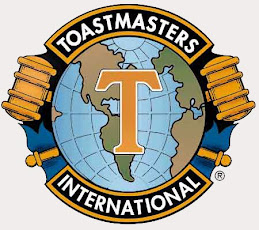My weekly VPE post is early this week because I found something I don't want to forget to share with you.
Craig Valentine is the World Champion of Speaking from 1999. You can find a lot of great information at this link:
http://www.craigvalentine.com/speech/articles.php
and you can sign-up for a tip from Craig each week for 52 weeks here: http://www.52speakingtips.com/
Today's topic is one of Craig's:
Ignite your Audience with your Introduction
Here is a traditional introduction speakers use:
Do yourself a favor and read the following paragraph out loud as if you are using it to introduce the next speaker for an event.
Our Next Speaker is the 1999 World Champion of Public Speaking. With more than 175,000 Toastmasters in 68 countries, and over 25,000 contestants, he came home with the first prize trophy and a significant amount of national and international recognition. In addition, our speaker is absolutely oblivious to the fact that we could care less what he has done and that we are much more interested in what we will be able to do after hearing him. Moreover, our speaker seems to have no idea that we are simply hoping for his autobiographical introduction to end so we can start clapping as if we are interested. Finally, he does not realize that we are beginning to say to ourselves, "His entire introduction is about him; therefore I bet his entire speech is about him also. Why did I even come here today?" So, with that said, please help me welcome to the stage, the person who would have the least effective introduction in history if it were not for the thousands of other presenters who have introductions just like his; the 1999 World Champion of Public Speaking, Craig Valentine.
Do you get the point? How similar is your introduction to my old one that you read above? Is it about you or is it about what your audience will get out of your speech? Everything you do should be about the audience, including your introduction.
An effective introduction is the difference between starting off in a hole or on solid ground. Here are some nuts and bolts tools you can use in your introduction to get off to a great start with your very next speech. Do not go into your next speech without them.
3. Build your credibility but only with your relevant credentials – For example, I have a specific introduction for my teambuilding workshops. This specific introduction includes a piece that mentions how I won 3 consecutive East Coast Conference Championships and played in 2 NCAA March Madness tournaments as a college basketball player. Because this part of my history relates to teams, it belongs in this introduction on teambuilding.
Then I go into a humorous story about why they do not like me, but it all is set up by the accolades (relevant ones) in my introduction. Find ways to make your introduction seamlessly feed into your speech. How do you currently tie your speech back into your introduction
5. Take everything about you and turn it into everything for them. If you do this, your audience will be ready and excited to receive your message. For example, instead of stating "Craig Valentine is the 1999 World Champion of Public Speaking" I could make that actually matter to them by saying, "The process you will pick up today helped our speaker become the 1999 World Champion and you can use it to become a speaker in high-demand." Do you get it? Turn everything about you into something for them. Doing this will get them fired up to hear your message. It tickles me now because when the introducer gets to the end up my introduction, he or she usually says, "Are you ready for the process?" At this point people actually begin yelling out, "Yes!" That is some great energy to walk into for a speech. Are you turning everything about you into everything for them?
Follow the 5 guideposts listed here and watch as your audience leans forward in their seats and anxiously awaits your presentation. That is how you ignite your audience with your introduction.
What's your opinion on Craig's suggestions? Please comment below.
John Schneyer
Vice President, Education




John this was a terrific posting. Tks for sharing this insight.
ReplyDelete